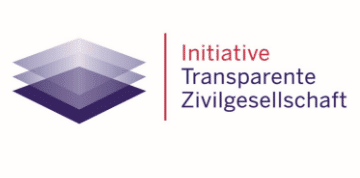Wildlife corridors
BOS Germany collaborates with the Rhino and Forest Fund to transform former oil palm plantations into thriving rainforests in northern Borneo, with the ultimate aim of establishing a wildlife corridor to preserve biodiversity.
A clear path for wild animals
Conservationists convert oil palm plantations into rainforest
In partnership with the Rhino and Forest Fund (RFF), BOS Germany is converting acquired oil palm plantations in Sabah into rainforest. This new rainforest creates a wildlife corridor connecting two nature reserves. 8,000 seedlings have already been planted on the first 50 hectares.
A wildlife corridor that saves biodiversity
Borneo’s tropical forests are among the oldest on earth. Rare animal species live here that exist nowhere else in the world. But their habitat and thus their future is threatened: every year, well over a million hectares of rainforest are destroyed in Borneo, mainly in order to cultivate oil palms. The resulting monocultures within a desolate landscape reduce biodiversity to a dramatic extent and are harmful to the environment. Unique wild animals such as the pygmy elephant, the banteng or the orangutan are losing their homes and thus their basis for survival. That’s because their habitat is becoming more and more fragmented due to mass deforestation. The original forest areas where the animals find food and mating partners are constantly decreasing. For many animals, the search for food ends in death when they cross the plantations and get too close to humans. But the problem is mainly long-term: the fragmentation of the habitat results in the animals remaining within their original group only, causing a continuously shrinking gene pool. This is one of the main reasons for species extinction. After all, greater biodiversity leads to more robust species that are more capable of adapting to the effects of climate change or diseases. That is why, in addition to protecting the remaining nature reserves, it is particularly important to connect the fragmented habitats. Only then can we sustainably protect wildlife, preserve biodiversity and create a healthy environment.
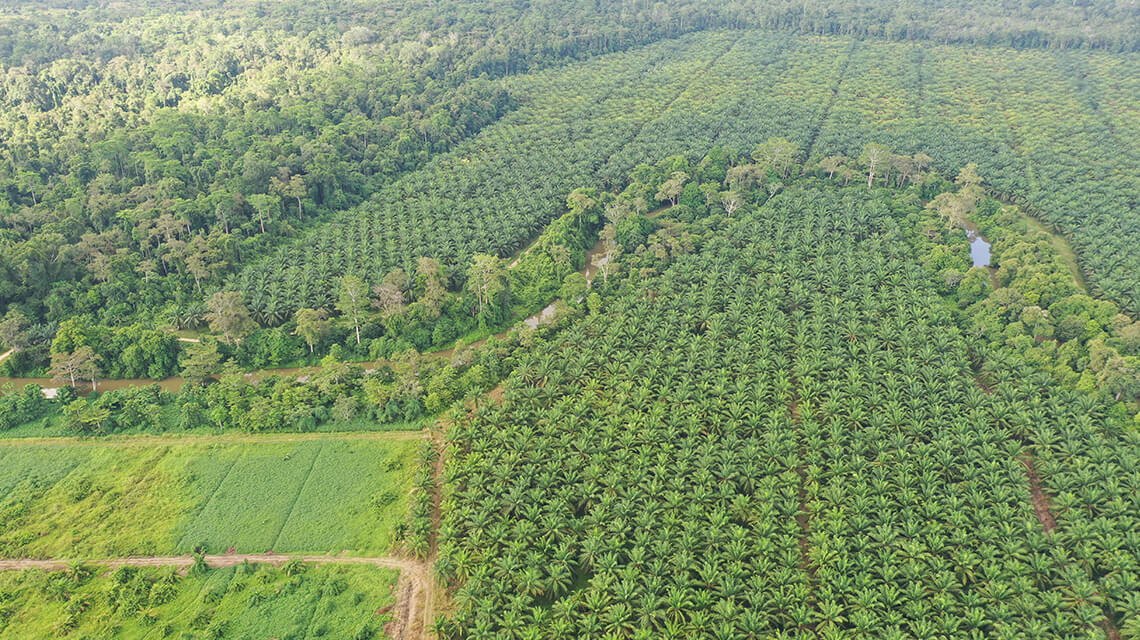
Former oil palm plantations are being turned into rainforests
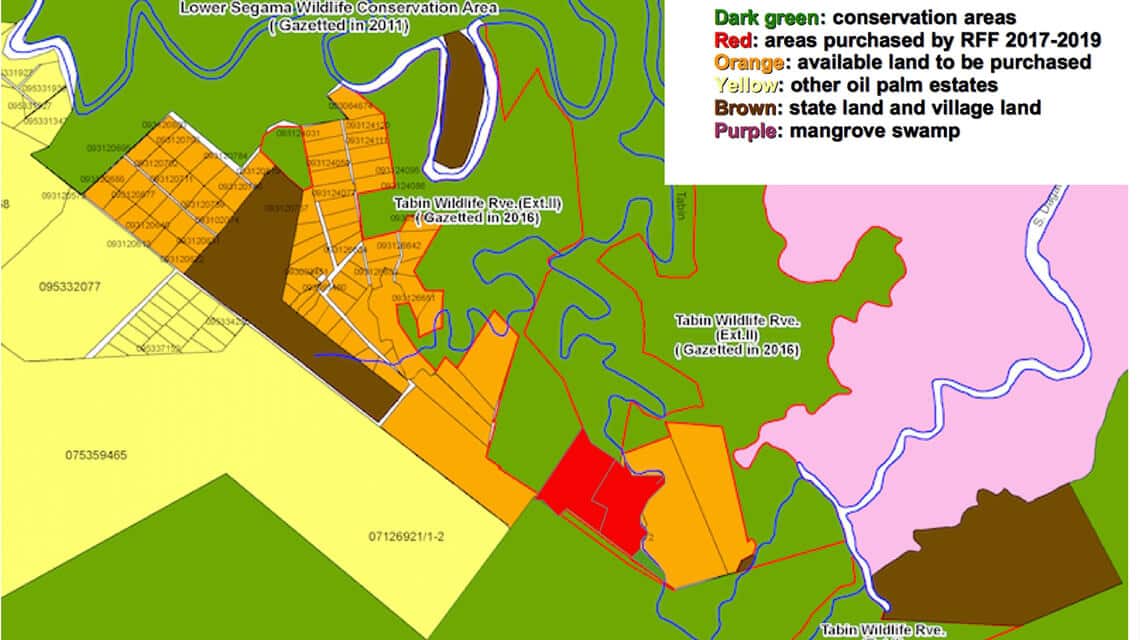
The wildlife corridor will connect two protected areas
The wildlife corridor connecting two nature reserves
For several years, we have been doing just that in the Department of Sabah, an area of Borneo that belongs to Malaysia: we are buying up old oil palm plantations and are renaturalising the rainforest. The project, which is co-financed by BOS, is creating an approximately 800-metre-wide wildlife passage between the Tabin and Kuamba nature reserves under the management of the RFF. “The aim is to transform these and other key areas back into near-natural rainforest. By doing so, they will connect valuable natural habitats as wildlife corridors before it will be too late for endangered species such as the orangutan, the banteng, the pygmy elephant and many others,” explains Robert Risch, project manager and board member of the RFF. To this end, the RFF has already acquired 65 hectares of forest and plantation land in Sabah in order to integrate these into the neighbouring protected areas. This will create an area of around 200,000 hectares of contiguous and protected rainforest.
8,000 tree seedlings have already been planted
The proud record after one year: 8,000 seedlings have already been planted on the first 50 hectares between Tabin and Kuamba. They were exclusively sourced from neighbouring forest areas and regional natural forests. Here, too, the focus is on biodiversity: So far, 32 different tree species from 14 families have been planted in the future wildlife corridor. Around half of the seedlings belong to the winged fruit family (lat. Dipterocarpaceae), which account for up to 80 percent of the natural canopy in Borneo’s lowland rainforest. They are the backbone of the original ecosystem and thus an important component of the ecological infrastructure. Other tree species produce fruit for wildlife or improve soil quality by enriching it with nitrogen. Still others further the development of a closed canopy. Self-recurring trees are included in the maintenance process as well and contribute to the natural regeneration of the forest. Additionally created small water bodies and grasslands will provide further habitats for wildlife such as bantengs, proboscis monkeys, Storm´s stork, pygmy elephants, orangutans and many other species in the future. The goal is to create a wildlife oasis with the near-natural rainforest that comes as close as possible to the enormous diversity of Borneo’s original habitats.
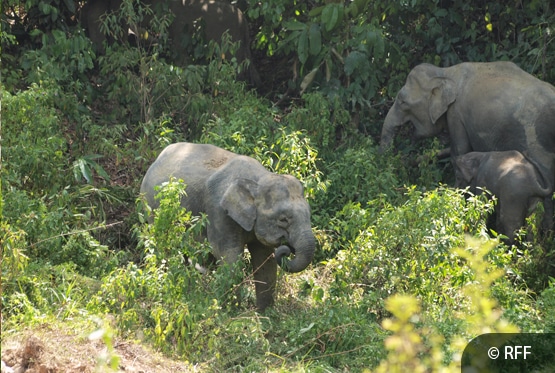
Bornean elephants belong to the endangered species
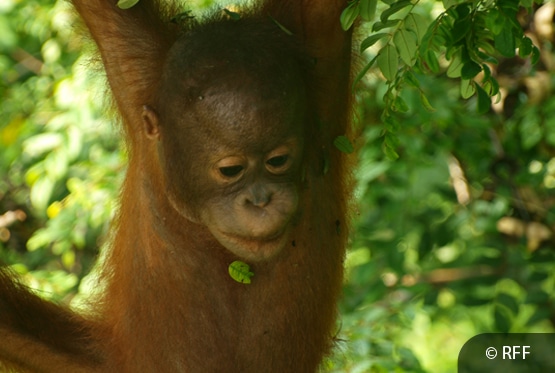
Wildlife corridor connects orangutan habitats
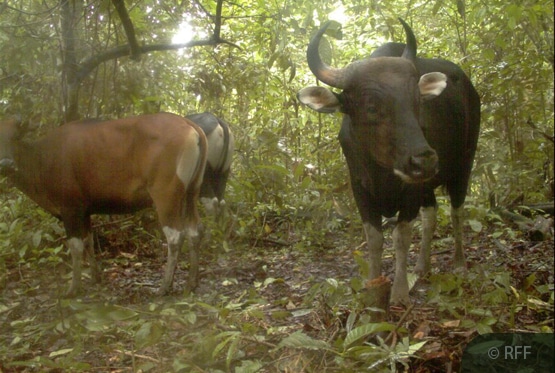
The bantengs in the province of Sabah belong to the local rare species
The wildlife corridor — a project with a future
The local population also benefits from this project. From the beginning, residents of a neighbouring village community have assisted in planting the seedlings and are taking care of their maintenance. This ensures the long-term rehabilitation of the habitats. In the long term, the new forest corridor is also expected to improve the water quality of the adjacent rivers — and fish and shrimp farming are the main sources of income for the local fishing villages in this part of Malaysia. Thus, eventually, everyone benefits from the renaturation of the purchased oil palm areas: The animals, the people and the rainforest.
A clear path for orangutans
The project is set to grow further: the RFF and BOS are planning to acquire additional palm oil plantations on Borneo and to convert them into near-natural rainforest as well. “Here in Sabah, we can make a very concrete contribution to the conservation of wildlife such as orangutans, Bornean elephants, proboscis monkeys, Malayan bears, wild cats and other endangered wildlife. What we have already achieved so far is a great success. By renaturating former agricultural land into rainforest, we are laying an important building block as part of a comprehensive strategy to protect biodiversity. And especially in times of Corona, this is a step in the right direction,” says Daniel Merdes, Managing Director of BOS Germany.
A Lifeline for Wildlife: Creating a Corridor
We are transforming plantations back into rainforests.
The habitat of the orangutan and many other rare species is dying, and with it, these unique creatures. Every day, vast areas of rainforest are destroyed for oil palm cultivation. In Sabah, Borneo, we are now reversing this trend. We purchase palm oil plantations and convert them back into thriving rainforests.

You have a question?
Donations are a matter of trust
Transparent use of funds is a matter of course for us. In September 2013, we joined the a non profit initiative of Transparency International Germany and signed its declaration of commitment.
